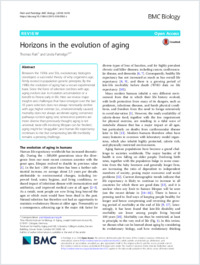Horizons in the evolution of aging
- Flatt, Thomas Department of Biology, University of Fribourg, Switzerland
- Partridge, Linda Max Planck Institute for Biology of Aging, Cologne, Germany - Institute for Healthy Aging and GEE, University College London, UK
-
20.08.2018
Published in:
- BMC Biology. - 2018, vol. 16, no. 1, p. 93
English
Between the 1930s and 50s, evolutionary biologists developed a successful theory of why organisms age, firmly rooted in population genetic principles. By the 1980s the evolution of aging had a secure experimental basis. Since the force of selection declines with age, aging evolves due to mutation accumulation or a benefit to fitness early in life. Here we review major insights and challenges that have emerged over the last 35 years: selection does not always necessarily decline with age; higher extrinsic (i.e., environmentally caused) mortality does not always accelerate aging; conserved pathways control aging rate; senescence patterns are more diverse than previously thought; aging is not universal; trade-offs involving lifespan can be ‘broken’; aging might be ‘druggable’; and human life expectancy continues to rise but compressing late-life morbidity remains a pressing challenge.
- Faculty
- Faculté des sciences et de médecine
- Department
- Département de Biologie
- Language
-
- English
- Classification
- Biological sciences
- License
- License undefined
- Identifiers
-
- RERO DOC 323288
- DOI 10.1186/s12915-018-0562-z
- Persistent URL
- https://folia.unifr.ch/unifr/documents/307062
Statistics
Document views: 93
File downloads:
- fla_hea.pdf: 156
